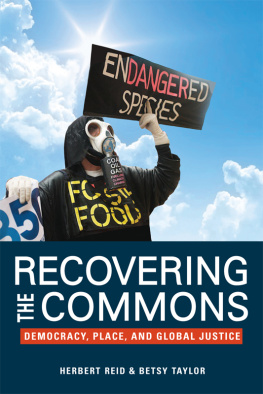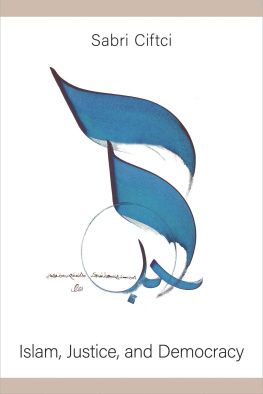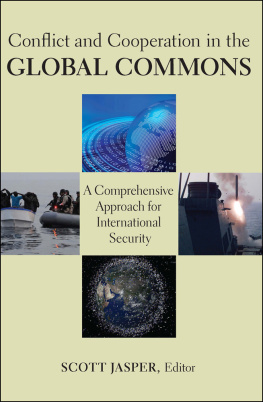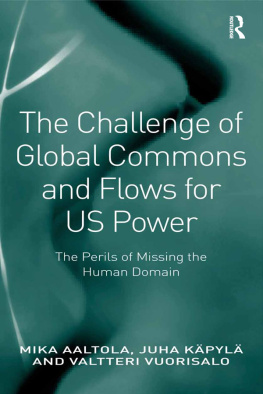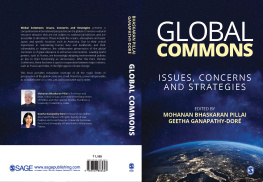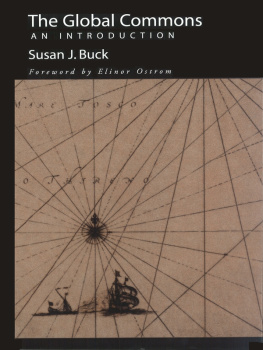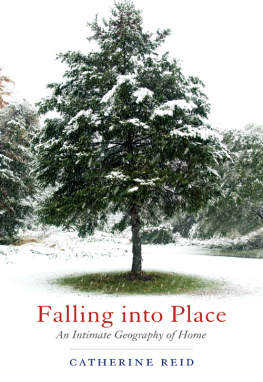2010 by the Board of Trustees
of the University of Illinois
All rights reserved
Library of Congress Cataloging-in-Publication Data
Reid, Herbert G.
Recovering the commons : democracy, place, and global justice /
Herbert Reid and Betsy Taylor.
p. cm.
Includes bibliographical references and index.
ISBN 978-0-252-03495-4 (cloth : alk. paper)
ISBN 978-0-252-07681-7 (pbk. : alk. paper)
1. Democracy. 2. Internationalism. 3. Justice.
I. Taylor, Betsy. II. Title.
JC 423. R 332 2009
321.8dc22 2009027103
Dedicated to Turner Bend
in the Arkansas Ozarks,
to Landour in Indias Himalaya,
and to the many other places
that have given us life
and world to care for
Without clay, without embodiment, there is no humanity, not only nowhere to be, in the sense of landscape, but no one to be there.
Marjorie Grene
Our era is destined to judge itself not from on high, which is mean and bitter, but in a certain sense from below.
Maurice Merleau-Ponty
Disillusionment with the world knows nothing of the sacrament of coexistence. It can find no place for the sacramental act. It can conjure out of itself no philosophy of action, for its ultimate implication is inaction.
Henry Bugbee
Acknowledgments
This book arose from conversations. It has been sparked by the extraordinary reflections and activism of grassroots activists and organizations with whom we have worked over the past decades. It will take several more books to speak adequately about the ideas and actions of these justice innovators. We name here but a few of the grassroots leaders who have inspired usAloma Burke, Joan Robinett, Teri Blanton, Daymon Morgan, Lynne Faltraco, Andy Jonesand salute the many others doing the crucial work of care for communities and earth. Our friends with Kentuckians for the Commonwealth, the Ohio Valley Environmental Coalition, and Coal River Mountain Watch have organized numerous conferences and events providing information, insights, and inspiration. Wendell Berrys work has been an invaluable reminder of a commonwealth alternative to Big Coal in Kentucky and elsewhere.
Mary Hufford has been a crucial friend and interlocutor. In her work as a public folklorist, Mary exemplifies the grace, brilliance, and groundedness of what we call participatory reason. We are especially thankful for the insights, generosity, and encouragement of Glenn Perusek over many years. Wolfgang Natter is a valued collaborator on several projects and enabled us to present some of these ideasincluding at the 2006 International Social Theory Consortium in Roanoke and a forum at Virginia Tech organized by the Alliance for Social, Political, Ethical, and Cultural Thought, which he directs. At the University of Kentucky, we have enjoyed the intellectual companionship of Dwight Billings, Christopher Rice, and Ernie Yanarella. Ananta Kumar Giri and Sanjoy Hazarika have been important windows on the world from India and elsewhere, and so has Ana Isla from Canada and Peru. We are indebted to Jack Herranen for his reports from Bolivia and East Tennessee.
Herbert Reid takes this opportunity to remember two marvelous friends who passed away in 2002 and 2003Erling W. Eng and Adolph Reed Sr. He is also indebted, in a variety of ways, to Randal Ihara, Tim Luke, David Rouse, Hwa Yol Jung, John ONeill, and Steve Fisher, among others. Film artists Anne Lewis and Herb Smith have been consistent sources of insight and inspiration. Betsy Taylor thanks Dana Nelson, Kathleen Stewart, and Christopher Davis for the conversations over the years that have catalyzed many insights about many thingsincluding the connections between democracy, talk, and friendship. Taylor developed key ideas in this book during the 20052006 year when she was Visiting Scholar at the Anthropology Department of Johns Hopkins University. She thanks Veena Das and others in the department for the hospitality, lively ideas, and quiet office during that year.
We were fortunate in being able to explore these ideas in various forums. We note the helpful debates of the conference Culture Matters: Understanding Development from the Perspectives of Margins, in October 2006, organized by the Deshkal Society and wonderfully hosted in the peaceful Sanskriti Kendra outside New Delhi. Betsy Taylor also thanks the Asian Development Research Institute for all the rich conversations connected with sessions they organized in February 2006 in Ranchi, Jharkhand, and Patna, Bihar, and points in between.
We give hearty thanks to our superb editor, Laurie Matheson, who has made it a pleasure to pull these complex conversations into a publication.
Some parts of individual chapters have been drawn from previous publications, with extensive rewriting and revision. We thank these publishers for permission to draw concepts from these earlier writings:
Reid, Herbert G. (2001). The Resurgence of the Market Machine-God and the Obsolescence of Liberal Democracy: On Academic Capitalism as Unsustainable Professionalism. Rethinking Marxism 13(1): 2744.
Reid, Herbert G., and Betsy Taylor (2000). Embodying Ecological Citizenship: Rethinking the Politics of Grass-Roots Globalization in the United States. Alternatives: Social Transformation and Humane Governance 25(4): 43966.
Reid, Herbert G., and Betsy Taylor (2003). John Deweys Aesthetic Ecology of Public Intelligence and the Grounding of Civic Environmentalism. Ethics and the Environment 8(1; special issue on Art, Nature and Social Critique): 7492.
Taylor, Betsy, and Herbert G. Reid (2000). Recovering Place-Based Knowledge and Cosmogenic Agency in Struggles for a Sustainable World. Indian Folklife 1(3) (October): 1011.
Recovering the Commons
Introduction
Googling for Moonscapes
Looking for allies, some community activists in New Guinea turned to cyberspace. But, what word to use to find people like themselves? Moonscape was the word they chose. This extraterrestrial word googled out for them a surreal geography of other communities, bound together in global cyberspace by common expulsion from earthly life forms and landscapesplaces-of-non-place that four of them were able to visit on a recent global tour of the unearthed. This is how Grace Koa, Poin Caspar, Wina Kayonga, and Patrick Pate came to visit Larry Gibson on Kayford Mountain in West Virginia (Fout, 2003).
Once the lowest mountain along its bend of the then deeply forested Coal River, Kayford Mountain now towers above moonscapes that have spread to the visible horizon and beyond in one decade. Dinned out in the national mediascapes by the latest confession from Paris Hilton (or whatever), the explosions bringing down the mountains of central Appalachia are heard by few Americans. This is the largest earthmoving project in human historyas coal companies turn from mining to what even they call mountaintop removal , exploding more firepower, every week, than the bomb that leveled Hiroshima. Kayford Mountain continues to exist only because Larry Gibson refused to sell fifty acres of his family land. And so Kayford Mountain rises as a fragile green mesa above the bizarre postbiotic, post-industrial landscape hundreds of feet below and falling. By staying put, Larry has created a landform of stark aesthetic power. Kayford Mountain has become a global
This book is about the kinds of pathways that met and parted on Kayford Mountain that day, and the kinds of conversations provoked by such crossroads. We believe that if there is hope for our species, it is in the hard thinking taking place at crossroads like this. We dont know much about the talk that day, since we only read about it in a half-page article in the newsletter of one of the always outgunned but tenacious Appalachian grassroots groups at the frontlines of the (as yet) chronically losing battle against mountaintop removal.

